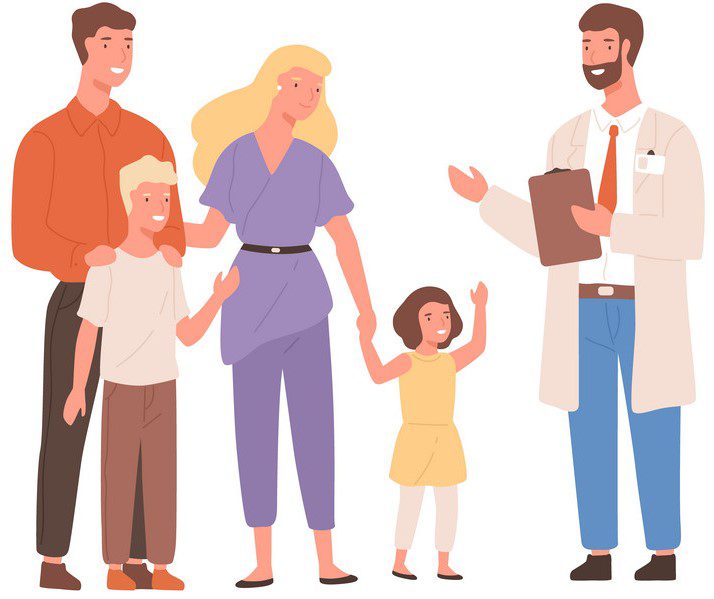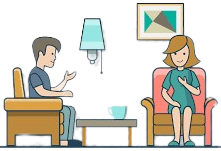
Family Counseling:
Family therapy or family counseling is a form of treatment that is designed to address specific issues affecting the health and functioning of a family. It can be used to help a family through a difficult period, a major transition, or mental or behavioral health problems in family members.
Family counseling, or family therapy, is a method to develop and maintain healthy and functional family relationships.
The goal is to identify and address problems in the family. These issues could be emotional, psychological, or behavioral.
Many approaches to family therapy stem from family systems theory. This suggests that families work in systems rather than groups of people who function independently of each other.
According to family systems theory, changes in one family member will influence Trusted Source changes in other parts of the family.
4 Stages in Family Counseling:
1—Planning. Stage 2—Assessment. Stage 3—Treatment. Stage 4—Disengaging or Re-contracting.
“There is no doubt that it is around the family and the home that all the greatest virtues… are created, strengthened and maintained”

Parenting Issues/Counseling:
Parent counseling is a service that aims to provide you with knowledge, guidance, tools, and emotional support, all without judgment or bias. Different from family counseling which has its own set of benefits, parent counseling focuses on how you as the parent affect the dynamics of your family.
Being a parent can be the most rewarding experience you go through, but can also be the most taxing. After teaching your child how to walk, talk, and even go to the toilet, you then move on to teaching them life skills like how to hold a conversation, or how to manage conflict.
Parent counseling provides different therapies or modalities that help parents better understand their inherent parenting style and then dives deeper into understanding how various problems affect, and potentially change, that style. When a parent is equipped with the knowledge of how to resolve their own personal issues, they are able to turn their full attention to maintaining, growing, or restoring harmony in their household.
A couple of years ago, if a parent-child combination experiences problems, the counseling began with the child. While child counseling is sometimes very necessary, the parent has a much larger capacity to make behavioral changes that will benefit the entire household.
“You will always be your child’s favorite toy”

Child Counseling:
Child counselors are mental health experts who take valuable insights into your kid social, mental, and emotional development. Many times, it happens that the closest persons to the child are not able to find the problems their child is suffering.
The aim of child Counseling
To maximize the opportunity for the child to pursue developmental milestones. These are set by the parents when they bring their child for therapy. They are related to the parents’ own agenda and are usually based on the child’s current behaviors.
When to look for a child counselor
If you find that your child is suffering from an emotional, social, or psychological disorder, and you find no way of helping him/her then you should definitely consult a child counselor.
Apart from the above-mentioned problem, a child counselor is helpful if your child is suffering from problems like Obsessive Compulsive Disorder or Attention Deficit Hyperactivity Disorder.
the five stages of counseling
The basic stages of counseling are: 1) Developing the client/clinician relationship; 2) Clarifying and assessing the presenting problem or situation; 3) Identifying and setting counseling or treatment goals; 4) Designing and implementing interventions; and 5) Planning, termination, and follow-up.
How is child counseling done
Conduct Therapy Sessions.
These psychologists work with children and talk with them to know their problems and help them deal with them. They are also concerned with the child’s parents and teachers and help them know the child better. They also conduct some tests and work accordingly.
Types of Child Therapies
- CBT (Cognitive Behavior Therapy).
- TF-CBT (Trauma-Focused Cognitive-Behavioral Therapy).
- Acceptance and Commitment Therapy.
- Dialectical Behavior Therapy.
- Psychodynamic Psychotherapy.
- CCPT (Child-Centered Play Therapy).
- Group Therapy.
- PCIT (Parent-Child Interaction Therapy).
“Children are not things to be molded, but are people to be unfolded”
Copyright © 2023 Perpetual Free Will. All Rights Reserved
Book Appointment
Submit Reviews